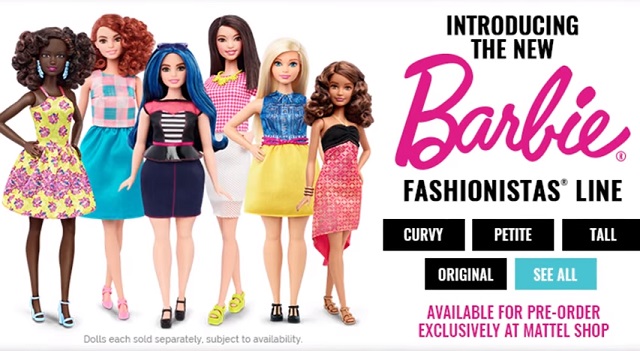Nice try, Mattel—but too little too late, you corporate monolith. We fatties don’t need your stinkin’ “Curvy” Barbie.
With the recent press release that Mattel is putting out new re-imagined Barbie dolls, the world is bowing at their condescending feet.
I applaud that they are offering some new options for dolls like different skin tones, different hair textures and diverse eye color. But offering up “Original,” “Tall,” “Petite” and “Curvy” sounds like a schizophrenic order at Kentucky Fried Chicken.
I am going to use the word fat here. Deal with it—it is an apt description.
I abhor the word “curvy” when someone is describing me or my ilk. Marilyn Monroe was curvy. Kim Kardashian is curvy. I am fat. True, my fat has curves, but that is because of its nature—fat is very rarely a straight line. Calling someone who is fat curvy is like calling a little person Fun-Size.
As someone who has been put into the categories of (including but not limited to): plump, pudgy, full-figured, zaftig, Rubenesque, fluffy, cushy, lush, ample, voluptuous, thick, BBW (“Big Beautiful Woman” for the uninitiated) and my least favorite, the Hillbilly wolf whistle—biggin’, I don’t need a fat Barbie doll to make me feel better about myself.
We get it. You think you are being nice. You are not. You are being superior. You don’t have to whisper that we are curvy—we get it—and we hear you, even when you think you are being quiet.
The thing is, there comes a time when you have to chart your own course—put on your own “Badge of Courage” and rock that size 14 or whatever you wear.
I had Barbie dolls as a youngster. I loved them. I had many. I had the corvette and the dream house. I had Ken, Midge, Skipper—and because my Mom was a civil rights advocate, I had dolls of every nationality she could find for me by the age of four.
My doll shelf looked like the United Nations. Not only was I the only person to carry the “Julia” lunchbox from Diahann Carroll’s groundbreaking TV show, I was the only person I knew to have the “Julia” doll. She was the most beautiful of the Barbie-type dolls, but they sewed her nurse’s hat to her head and even when she was wearing a ball gown, she still looked like a medical professional on duty.
Dolls are to dream about. They have perfect lives where they live in Malibu, Ken never cheats, and their thighs never touch. They are not meant to represent real life, real people, real…anything.
Maybe I was a weird kid, but I never thought I should look like Barbie. I never wanted to have her odd shaped body, absent of nipples, with no way to pee (or poop). I may have coveted her clothes, but I coveted a lot of peoples clothes.
Even though I was a thin kid, I realized quickly that everything I saw in a magazine or on TV did not look great on me. I learned some tough lessons by spending my babysitting money on trendy clothes that made me look like some weird cousin on “Little House on the Prairie.”
I gained weight later in my teen years, and I got fatter in my 20s. I have been both fatter and thinner than I am right now. And yes, I sometimes fret about not looking the way I’d like to—but a doll will not bring me that inner-acceptance, and it wouldn’t have as a child either.
Will these new differently-sized dolls still be called “Barbie,” or will they be given new monikers like “Stretch” and “Lil’ Bit” and “Biggin’”?
Offering different hair textures, a wider selection of eye color that isn’t always blue and a skin tone that isn’t opaque pink—those are good things. However, offering different “body types” is haughty and disdainful.
I demand that Mattel release “Middle-Aged Ken” and “Same-Sex Roommate Midge.” I want Ken to have a paunch, graying temples and rubber soled shoes, because his knees are shot from too many rogue games of beach volleyball. I want him to wear Hawaiian shirts from Tommy Bahama because they will hide his belly. I want Midge to have a pierced tongue, a flat top hairstyle and a plaid shirt from Old Navy. Does that make anything any better for anyone?
I would not have felt better as a fat, young person if I had been given a fat—oh, excuse me—curvy Barbie. I probably would have buried her in the back of my doll shelf or in the bottom of my Barbie carrying-case, along with the doll from Outer Mongolia, because I didn’t like her frumpy outfit.
I know my fervent plea will not get Mattel to change their plans—but don’t be surprised if the “Curvy Barbie” gets pushed to the back of the closet next to the old Paddle Ball and the stretched out Slinky.
I don’t have children. But I did have a Mom. She was very adept at getting me to appreciate my 5’8 self in the seventh grade, when I was one of the tallest girls. When I developed before most of my friends, she took me to a big fancy department store to be fitted for a real bra when the fun training bras I had so loved were no longer doing the trick. She made it a celebration, even though I became very skilled at unhooking it and pulling it off through my sleeve in the time it took to exit the school bus and enter the house with it in my hand.
I am not saying it all falls on parents to form your child’s self-worth—but when it comes to the external things, parents can certainly make a big difference in how a child sees themselves. We have to let them be who they are, and they won’t need a doll for anything other than acting out daydreams that even they know—in their newly formed subconscious—are fantasy.
It’s is important for kids, especially young girls, to realize there are role models that are like them. However, being accepting of them no matter what body type they inhabit is more important.
Let them decide how they want to look and who they want to emulate. Getting them to recognize their own unique selves is more important than buying them a doll that somehow looks like them or what society perceives looks like them.
.
Author: Melissa Morgan
Editor: Yoli Ramazzina
Photo: Screenshot.

 Share on bsky
Share on bsky







Read 4 comments and reply